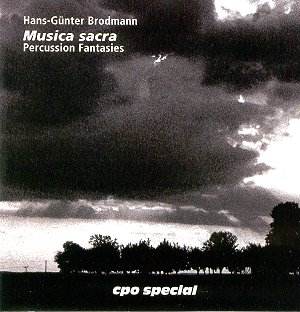Hans-Günter BRODMANN
Musica Sacra Percussion Fantasies
 all music performed by the
composer
all music performed by the
composer
 CPO 999 749-2
[52:27]
midprice
CPO 999 749-2
[52:27]
midprice
Crotchet

This is a strange disc to find on CPO, one of those releases to engender
all sorts of arguments as to what classical music is on the eve of the third
millennium. From the brooding black and white photo onwards this is the sort
of release one might easily imagine on ECM. There are seven pieces, all written
and performed by Hans-Günter Brodmann, though given that there is an
improvisatory element to each work one again thinks of ECM and that company's
often tangential jazz. While the instrumentation is not alien to the classical
world, other than in the rare percussion concerto djembe, bass bars, crotales,
shakers, tam tams, bells, gongs, cymbals 'and others' are generally subordinate,
here elevated to prime position. These 'real' instruments are complimented
by the musical/ambient use of everyday sound; rain, a thunder storm, a cork
popping, a subway train arriving at a station. Although it does not say in
the booklet, it appears these sounds have been sampled and looped, the even
bleat of a single cricket throughout the 11 minutes of 'Respect' having the
same potential as Chinese water torture.
The pieces are linear, constructed around simple, endlessly repeated rhythmic
motifs, the improvisatory element present in the subtle use of individual
sounds such as the gentle chimes and bells of 'Turmalin'. According to the
notes by Roland Spiegel the music was inspired by listening to tape-recorded
impressions from nature while on a trip to Tuscany: the result is Musica
Sacra, 'in which the I is reflected as part of a higher order (however
one may wish to term this higher order).' Which sounds like typical pantheist
nature-rapture, a more intellectual version of New Age music dating back
to Keats and Blake, or else an ill defined general purpose mysticism. Speigel
assures us that this is not the case; the music is more than this because
it 'departs from the traditional dramaturgical laws of Western music and
thus shares something, for example, with John Cage's first string quartet,
a work reflecting the influence of Zen Buddhism'. Which to be cynical, is
perhaps why no one swats the fly irritatingly buzzing around 'Earth'.
Speigel changes tack to suggest the music works as a single piece akin to
a score for a none existent film. Certainly fans of Pink Floyd's music for
More and La Vallée (Obscured by Clouds) may likewise
adopt these understated nature landscapes. One can not help feel this could
be the soundtrack to a French arthouse film, perhaps a modern variation on
L' Année dernière à Marienbad, influenced by
70's avant garde rock and classical music alike. It is too unsettling
and even irritating to be background music, to uninteresting to be fully
listened to, yet does achieve the apparent aim of creating a sound canvas
into which one might become mentally absorbed. A film to which one can bring
one's own characters and images. How often one might want to will be a very
personal decision, and how you react to this disc will very much depend upon
your mood at the time and your willingness to accept its own slow-motion
timeframe and philosophy. Personally, it gives me a headache.
Gary S. Dalkin


